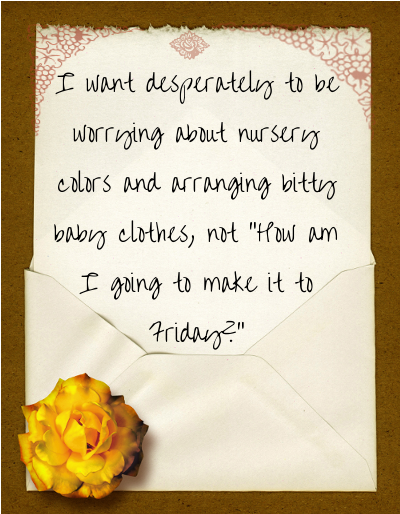 As I was clicking through all the Postpartum blog posts from this past week, one stood out.
As I was clicking through all the Postpartum blog posts from this past week, one stood out.
The sheer honesty, power, intensity, and raw emotion of the writing leapt off the screen at me. I found myself nodding my head several times, connecting with her story. It is a rare thing to find a writer who not only opens up about her experience with mental illness but does so in such a way that she captivates you, drawing you in until it is just you and her words.
You can find her story here.
Sue’s story really started to speak to me when she mentioned her issues with her pelvis. I had similar issues with all three of my pregnancies. It was never as severe as hers but lemme tell you, when your body produces entirely too much relaxin and your hips can barely keep themselves together to keep the baby in, the pain is excruciating. During my first pregnancy, I could barely put on underwear or shoes without weeping from the intense pain. Turning over in bed? Out of the question. I prayed I wouldn’t have to pee in the middle of the night. We had to get a tempurpedic mattress topper just to make it tolerable. And sleeping on my side (ie, on my HIPS/Pelvis) made things worse. My first OB, classic knowledgeable God that he was, simply told me “Welcome to pregnancy.” Sorry dude, but normal pregnancy should not have you in tears as you get dressed. I ended up on self-commanded bed rest the last two months of my first pregnancy because walking around hurt too much. I stayed propped up on the couch with a vibrating heating pad most days and watched TV. It sucked.
My second pregnancy began to head the same way at four months along. New OB this time – I got PT, which helped. Third pregnancy, symptoms showed up at three months. I got water therapy and it? Was a lifesaver. I ended up agreeing to getting induced at 38 weeks because by that time, baby was so low and weighing so heavily on my weary pelvis that I could again barely walk.
Often times, doctors here in the US are misguidedly unaware of this rare pelvic disorder and brush it off as “normal” pregnancy pain/adjustment. But it’s not. And it can disable you for life if handled incorrectly, especially if you have a vaginal delivery and are suffering from a severe case of it as Sue found herself. For most, the pelvic pain does fade after birth but many women struggle with pelvis issues for life. I could feel my pelvis shift in and out of joint after my second pregnancy, especially when driving my car. It was worse after my second delivery. I can still pop it in and out of joint. But lemme tell you, it hurts like the dickens if it’s out. Oh, the burning, the aching… it’s enough to make me want to take a tranquilizer. I am doing much better these days as I’ve been faithful with doing yoga each and every morning. But the issues caused by pregnancy and relaxin will haunt my pelvis for life, I fear. It’s a large part of why I will never get pregnant again. I don’t think my pelvis could handle another pregnancy. Physically and mentally, I am done.
Enough about me though, let’s get back to Sue. This is, after all, her award post! (I apologize for the digression, it’s just so rare to read about someone else who went through similar pelvic issues during pregnancy!)
Sue’s post is entitled “My Voice, My Depression” and with those words, she owns her Depression instead of the other way around. Sue takes back the power which Depression can hold over so many of us.
My favorite passage:
I am desperately trying to get past this time in my life, but I know it will take some time. I have acquired the amazing talent of hiding all of what I have said above from the rest of the word. If you see me on the street you would think nothing but, there goes funny, upbeat Sue. While underneath I an working, fighting and choosing a happier path than I have had the last few years.
These days are hard because I am trying my best to work though them. Emotional work is extremely difficult. It consumes you and can bring your life to a screeching halt.
Sue is in the middle of her Postpartum experience, still struggling, still fighting to escape the fog and the darkness. And yet she has written with such clarity about the journey she is currently experiencing. For that, she is The Postpartum Voice of the Week.
 Happy. Glowing. Ecstatic. Overjoyed. Thrilled. Sparkling. Beside herself with glee.
Happy. Glowing. Ecstatic. Overjoyed. Thrilled. Sparkling. Beside herself with glee.



